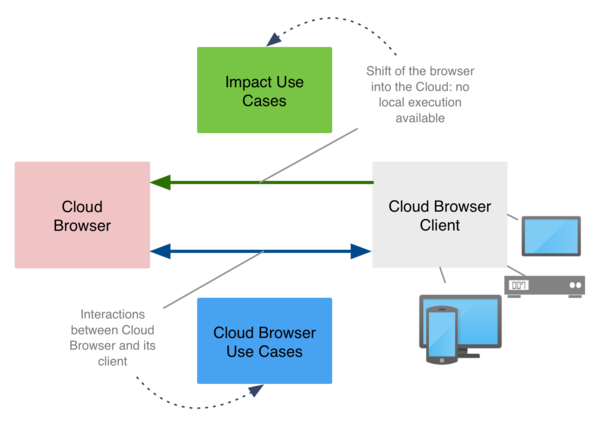Main Page/Cloud Browser TF/UseCases
This page is dedicated for the discussion on use cases in the Cloud Browser TF.
Cloud Browser Taskforce Use Cases
Abstract
This document describes use cases for the Cloud Browser.
Introduction
Cloud Browser Use Cases are split into two categories. The cloud browser API use cases and impact use cases.
Cloud browser API uses cases
Enabling a cloud browser solution will need communication between a client and a server. These uses cases will gather requirements what will be needed to enable the core functionality. The use cases will probably used to create a new standard.
Impact Use Cases
Impact Use Cases describe the challenges that the Cloud Browser encounter. i.e.which use cases will work on a local browser but are problematic on a cloud browser. These use cases will probably used to extend or modify existing standards.
Status of this document
This is a public working in draft collection of use cases that the Cloud Browser Task Force is discussing and exploring. It has no official standing of any kind and does not represent the support or consensus of any standards organization or contributor. This is a subset of the W3C Public Web & TV Interest Group - Cloud Browser Task Force.
Common Requirements
- As the CB TF proceeds this section will be used to capture common requirements that have reached rough consensus within the group
Impact Use Cases
Use Cases that describe Cloud Browser challenges
video
- MSE
- use case for Media Source Extensions
- EME (to be done)
- Tuner
- use case for Tuners
QoE/QoS
Client-side locally executed measurements for QoS/QoE metrics. These could include but are not limited to: latency; delay, jitter, packet loss; video quality (blockiness, jerkiness, blur); etc.
Accessibility Use Cases
- Second screen and other devices
- Alternative Content Technologies
- Interactivity: controls and menus
Cloud Browser API Use Cases
These Use Cases provide the core functionality of the Cloud Browser.
control
state
session
communication
Template for Cloud Browser Use Cases
- This is a generic template for proposing use cases that should be discussed by the Cloud Browser TF.
- !- See the comments in the source for this page to get a cut-page template -!
- UC-
- use case ID and title
- Extends
- use case IDs of the other use cases this extends/builds on, if required
- Precondition
- technical or architectural preconditions that are necessary for the use case, if required
- Description
- high level description/overview of the goals of the use case.
- Schematic Illustration (devices involved, work flows, etc) (Optional)
- Implementation Examples (Optional)
- Actors
- declare any new distinct actors/services/devices that need to be defined. Please, describe your actors in the Terminology section, if you introduce new actors.
- Dependencies
- other use cases, proposals or other ongoing standardization activities which this use case is dependant on or related to'
- Gaps
- Gaps in available standards or technology that this use case identifies or is dependent upon
- Notes
- any relevant comment that is good to track related to this use case. Please, provide here the information about to which architectural approach this UC could be mapped (e.g., Single Stream Cloud Player). For more detailed description of approaches, please see Cloud Browser Architecture)
- Requirements
- Which requirements this UC provides towards the Cloud Browser API or impact use cases?
- Author(s)
- list author/contributor names and email addresses. Add additional contributors over time
- History
- date+editor+short description of what was changed.
- example: 3-12-2015 Glenn Deen added history section to use case template
Normative References
[RFC 2119] Bradner, S., "Key words for use in RFCs to Indicate Requirement Levels", BCP 14, RFC 2119, March 1997.
